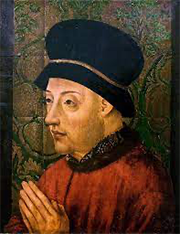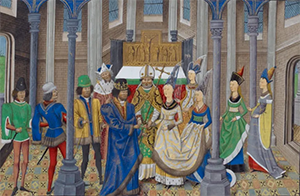King John (João) I of Portugal
John (João) I was King of Portugal for 48 years in the 14th Century and 15th Century. His long, mostly peaceful reign set the stage for his country's overseas empire. 
He was born on April 11, 1357, in Lisbon. His father was Prince Pedro, oldest son and heir apparent to the reigning monarch, Afonso IV. His mother was a woman named Teresa, who was not Pedro's wife. Pedro became king the very next month and reigned for a decade. When he died, on Jan. 18, 1367, Ferdinand, his oldest son, became king. Portugal and Castile had been allies and then antagonists, varying sometimes from year to year, from monarch to monarch. In 1369, Ferdinand made an attempt to take the throne of Castile. He did not succeed, and a series of wars over the Castilian throne ensued. Near the end of his reign, Ferdinand threw off an alliance with the English nobleman John of Gaunt and made a separate peace with Castile, gaining an alliance in the form of a royal marriage, as his daughter Beatrice married John of Castile. Ferdinand and his wife, Queen Leonor, had no sons. When Ferdinand died, on Oct. 22, 1383, this lack of a male heir sparked a succession crisis. Beatrice, his oldest daughter, was nominally the ruler of Portugal, with her husband, John of Castile, as her father's preferred consort. The armies of Ferdinand's son John, known as John of Aviz, had other ideas and arrived to press their case. At the 1384 Battle of Atoleiros, the forces of John of Aviz prevailed but it was nowhere near as decisive as he needed it to be. The two sides fought on, with a Castilian force besieging Lisbon and nearly taking it. A timely arrival of English allies in 1384 rescued Lisbon for the Portuguese John. Another infusion of English troops the following year enabled John to take control, summon the Cortes, and have himself proclaimed King of Portugal. This occurred on April 6, 1385. The Castilian forces fought on, with the struggle culminating in the Battle of Aljubarrota, a particularly brutal struggle along the lines of what was happening in France during the concurrent Hundred Years War, with English troops aiding John of Portugal and French troops aiding John of Castile. That Portuguese victory, in August 1385, cemented King John's status as ruler. 
The king ruled alone for more than a year, marrying Philippa of Lancaster on Feb. 2, 1387. Her father was John of Gaunt, and the marriage consolidated an alliance between Portugal and England, cemented in the Treaty of Westminster. John and Philippa had eight children, six of whom lived into adulthood: Duarte, known as Edward (1391), Pedro (1392), Henry (1394), Isabella (1397), John (1400), and Ferdinand (1402). John enjoyed a peaceful rule into the 15th Century, even as his Spanish neighbors continued to struggle with their Reconquista, retaking lands seized by Moorish forces centuries beforehand. John authorized a 45,000-man-strong expedition into North Africa in 1415, besieging and then taking the city of Ceuta. Of note during the battle were the actions of John's son Henry. The successful defense against a counterattack in 1419 solidified the Portuguese foothold in the African continent and was the start of an overseas empire. Soon sailing were expeditions down the western coast of Africa and out into the Atlantic, resulting in the conquests of Madeira in 1417 and the Azores in 1427. Papal recognition of such exploits gave the Portuguese Crown the permission it needed to add slaves to its burgeoning trade network. King John I, referred to many in his life time and beyond as John the Good and John the Great, died on Aug. 14, 1433, in Lisbon. His reign was the longest of any Portuguese monarch. His succession was a peaceful son, his oldest son, Edward, taking the throne. Before he was king, John had been master of the Order of Aviz, a religious order, and had access to a large amount of learning. He fostered learning in his children, who went to great accomplishments, so much so that many historians refer to them as "the illustrious generation": Edward was a poet and writer, Pedro was respected as one of the most knowledgeable men in Europe, and Henry turned his talents to geography and science, becoming known as The Navigator.
|
|
Social Studies for Kids
copyright 2002–2026
David White




